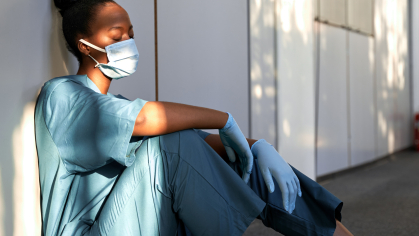Getting Ready to Run for Office During COVID Era

The coronavirus pandemic has made campaigning in the 2020 presidential general election like no other in the past century; even President Donald Trump was taken off the campaign trail by a COVID-19 infection. More recently, staffers for both Kamala Harris and Mike Pence tested positive for the virus within the last few weeks of the election season.
Jean Sinzdak, associate director of the Center for American Women and Politics (CAWP) at the Eagleton Institute of Politics at Rutgers University-New Brunswick, discusses the challenges and opportunities of running for local, state and national office when social distancing, instead of knocking on doors, is the new normal.
What challenges does COVID present for people campaigning for office?
The pandemic presents some immediate and pressing challenges for candidates running this year. The old playbook for campaigning has been essentially thrown out the window as candidates have to figure out how to connect to voters safely during a time of social distancing. Traditional campaign strategies for voter outreach, including door-to-door canvassing, fundraising events and other meet and greets, and rallies, are not available. This is especially a challenge for newcomers as they struggle to find ways to make a name for themselves and connect with voters without the opportunity to meet people face-to-face.
In addition, candidates have been forced to reshape campaign messaging to address the unfolding crisis. Candidates also had to rethink their fundraising strategies, because they do not want to appear out of touch with the economic crisis and because of the reality of many more people suddenly feeling stressed financially.
From a logistical perspective, the chaos of the pandemic has created a lack of clarity about election processes, since many had to be shifted. Primary dates were postponed, candidate nominating conventions were canceled and in many places, new voter processes are now being deployed, including mail-in ballots and altered polling hours/dates. Candidates need to navigate the process and help make sure their voters and constituents have the right information.
What advice do you have for candidates running in the social-distancing era?
First and foremost, do not let the pandemic stop you from running for office. As the situation continues, we’ll see some of the same challenges in the next election cycle that we’re seeing for candidates in 2020. The good news is that many candidates have risen to the occasion and pivoted their campaigns to meet the virtual moment, running successful and innovative campaigns. The candidates who are nimble and willing to adjust their strategies as needed, including embracing new ideas and new technology, will be able to run effective campaigns.
In terms of specific advice: don’t be afraid of the telephone. Many candidates are spending more time on the phone than ever before, both in checking in with voters and in fundraising appeals. Candidates are also spending more time in virtual meetups and embracing creative approaches to getting their messages out, including livestreaming shows and hosting podcasts. Instead of knocking on doors, they are providing information via social media and virtual town halls. The sooner you are comfortable harnessing technology for voter contact, the better off you will be.
Candidates should lean a bit more on advertising, direct mail and yard signs, with the exact mix of strategies somewhat dependent on your specific race and the makeup of the district you’re running in. Importantly, for many candidates going forward, it is crucial to be a source of reliable information for your community. Sharing information about public health and safety, election processes and other practical information is valuable and can also help your candidacy as people come to rely on you as a source of accurate and useful information. Make sure you are in touch with the issues facing your community during this moment and offer ideas and solutions to be helpful.
How is CAWP preparing women candidates for campaigning during COVID?
After canceling our annual in-person Ready to Run® Campaign Training this past March due to the state shutdown, we pivoted to virtual training, hosting a six-week series of webinars focused on a different campaign training topic each week. We covered how to organize your campaign, how to fundraise during an economic downturn, effective campaign messaging during crises, presenting your best virtual self when you can’t campaign in person and digital strategies for virtual campaigns. We plan to host another webinar series this winter; more details will be available soon on CAWP's Ready to Run webpage.
Why does running for/serving in public office matter?
Running for and serving in public office is one of the best ways to have an impact on your community. This pandemic has brought about unparalleled crises in our communities, laying bare challenges faced by Americans economically, politically and socially. Now, more than ever, we need able public servants to help guide our communities through the most challenging times we have faced. This is the time to address public health, help build unity and consensus among residents, deal with the economic fallout facing businesses and much more. You know your community and the issues it faces. If you have a passion for making change and helping your neighborhood thrive, there has never been a better time to run. If, however, running for office isn’t for you, look for candidates you can support and help them succeed in their campaign.


